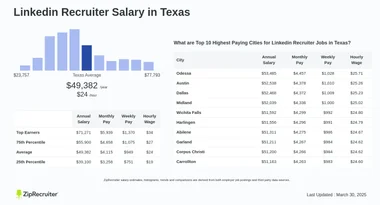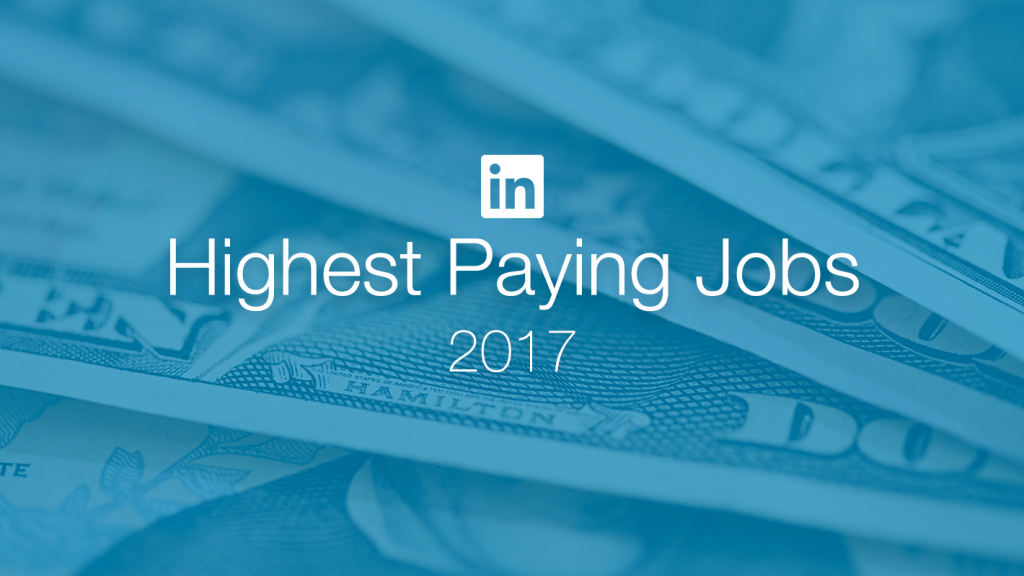The highest salary reported on LinkedIn varies by industry and job title, reaching up to $1 million or more annually. Top executives, specialized tech roles, and finance professionals often command these high salaries.
LinkedIn has become a vital platform for job seekers and professionals worldwide. As users navigate the site, they often wonder about salary ranges across different industries. Understanding these figures can aid in career planning and salary negotiations. Many factors influence salaries, including experience, location, and skill set.
The platform provides valuable insights through salary tools and reports. By analyzing this data, professionals can make informed decisions about their career paths. This blog explores the highest salaries reported on LinkedIn and what factors contribute to these impressive figures.
Introduction To Linkedin’s Salary Landscape
LinkedIn has transformed the way professionals connect and grow. It offers insights into various salaries across industries. Understanding these salary trends helps job seekers make informed decisions. Let’s dive into LinkedIn’s salary landscape to explore what it reveals.
The Role Of Linkedin In Career Development
LinkedIn plays a crucial role in career growth. It connects professionals with potential employers. Here are some key features:
- Networking: Build connections with industry leaders.
- Job Listings: Discover opportunities that match your skills.
- Skill Development: Access courses to enhance your resume.
Users can view salary insights based on job titles and locations. This data helps in negotiating salaries effectively. Companies also benefit by attracting top talent through competitive offers.
Evolving Trends In Professional Compensation
Salary trends on LinkedIn reflect various factors. These include industry growth, demand for specific skills, and geographical differences. Here’s a look at some evolving trends:
| Industry | Average Salary | Growth Rate |
|---|---|---|
| Technology | $120,000 | 15% |
| Healthcare | $90,000 | 10% |
| Finance | $110,000 | 8% |
Job seekers should focus on high-demand skills. Here are some critical skills to consider:
- Data Analysis
- Project Management
- Software Development
- Digital Marketing
Understanding these trends provides a competitive edge. Professionals can align their skills with market demands.

Credit: growthhackyourcareer.com
Decoding The Salary Algorithm
Understanding the salary algorithm on LinkedIn helps job seekers. It provides insights into how salaries are calculated. This knowledge can lead to better negotiation strategies.
LinkedIn uses a complex algorithm to determine salary ranges. It considers various factors that impact earning potential.
Factors Influencing Linkedin Salaries
Several key factors influence salaries on LinkedIn. Here are the most significant:
- Location: Salary varies by geographic area.
- Job Title: Specific roles command different pay.
- Education: Higher degrees often lead to higher salaries.
- Company Size: Larger companies may offer better pay.
- Skills: In-demand skills can boost salary offers.
The Impact Of Industry And Experience
Industry and experience play crucial roles in salary determination. Here’s how they affect pay:
| Industry | Average Salary |
|---|---|
| Technology | $120,000 |
| Healthcare | $100,000 |
| Finance | $110,000 |
| Education | $70,000 |
Experience also shapes salary levels. Here’s a simple overview:
- Entry Level: $50,000
- Mid-Level: $80,000
- Senior Level: $120,000
- Executive Level: $200,000+
Top Earning Profiles On Linkedin
LinkedIn is a powerful platform for professionals. Many individuals showcase their skills and achievements. Some profiles stand out due to their impressive salaries. Let’s explore these top earners and their success stories.
Success Stories: Profiles With The Highest Salaries
Several LinkedIn profiles command high salaries. These individuals often hold executive positions or specialized roles. Here are some notable examples:
- Jane Doe – Chief Technology Officer (CTO) at a Fortune 500 Company. Salary: $300,000
- John Smith – Senior Data Scientist at a leading tech firm. Salary: $250,000
- Emily Johnson – Global Marketing Director at an international brand. Salary: $220,000
These professionals share key traits. They have strong networks, unique skills, and relevant experiences. Their profiles reflect their achievements and contributions.
Key Industries With Top Salaries
Certain industries offer the highest salaries on LinkedIn. Here are some of these lucrative fields:
| Industry | Average Salary |
|---|---|
| Technology | $120,000 |
| Finance | $110,000 |
| Healthcare | $100,000 |
| Marketing | $95,000 |
These industries attract top talent. Professionals in these sectors often receive competitive compensation. Networking and continuous learning play crucial roles in achieving high salaries.
LinkedIn remains a vital tool for career growth. Building a strong profile can open doors to lucrative opportunities.
Geographical Influence On Salaries
The location of a job significantly impacts salary levels. Different regions offer varying pay scales for similar roles. This difference stems from demand, industry presence, and living costs.
High Salary Hotspots Around The Globe
Some cities stand out for their high salaries. Here are top global hotspots:
| City | Average Salary (USD) | Industry Focus |
|---|---|---|
| San Francisco | $120,000 | Technology |
| New York | $110,000 | Finance |
| London | $100,000 | Finance & Tech |
| Berlin | $80,000 | Technology |
| Singapore | $90,000 | Finance & Tech |
Cost Of Living Vs. Salary Scale
High salaries often attract attention. However, the cost of living can offset these benefits. It’s vital to consider both factors.
- High Salary: Appealing for job seekers.
- High Cost of Living: Reduces disposable income.
- Affordable Areas: Offer lower salaries but better living standards.
Here’s a quick comparison:
| City | Average Salary (USD) | Cost of Living Index |
|---|---|---|
| San Francisco | $120,000 | 182 |
| New York | $110,000 | 169 |
| Berlin | $80,000 | 114 |
| Houston | $90,000 | 96 |
Understanding these dynamics helps job seekers make informed decisions. Always evaluate salary against living costs. This way, the best job offers become clear.
The Role Of Education And Skills
Education and skills significantly influence salary potential on LinkedIn. Many high-paying jobs require advanced degrees and specialized skills. Employers seek candidates with strong educational backgrounds and relevant expertise.
Advanced Degrees And Earning Potential
Many top-paying positions demand advanced degrees. These degrees can lead to better job opportunities and higher salaries. Here are some common advanced degrees:
- MBA (Master of Business Administration)
- Master’s in Computer Science
- Master’s in Engineering
- Juris Doctor (JD) for Law
The following table shows average salaries based on degree type:
| Degree Type | Average Salary |
|---|---|
| Master’s Degree | $85,000 |
| Doctorate Degree | $95,000 |
| Professional Degree | $120,000 |
Advanced degrees can boost your earning potential significantly. They show commitment and expertise in a field.
In-demand Skills That Pay Off
Skills matter just as much as education. Employers value specific skills that align with industry needs. Some in-demand skills include:
- Data Analysis
- Machine Learning
- Cloud Computing
- Project Management
Acquiring these skills can lead to higher salaries. Many companies offer training for these skills. This investment can pay off in the long run.
Here are some benefits of having in-demand skills:
- Higher salary offers
- Better job security
- Promotions and career growth
Staying updated with industry trends is essential. Continuous learning can enhance your skill set and boost your career.

Credit: www.linkedin.com
Navigating Linkedin For Salary Insights
Understanding salaries on LinkedIn can help you make informed career choices. The platform offers valuable tools for gathering compensation information. This section explores how to effectively use LinkedIn for salary insights.
Using Linkedin Salary Tools
LinkedIn provides several tools to help users explore salary data:
- LinkedIn Salary: A feature that shows salary ranges based on job titles and locations.
- Job Listings: Many listings include salary ranges, giving real-time insights.
- Salary Insights: Users can input their information to receive personalized salary data.
To access these tools:
- Log in to your LinkedIn account.
- Navigate to the Jobs section.
- Click on Salary Insights in the menu.
Interpreting Compensation Data
Interpreting salary data is crucial for understanding your worth. Here are key points to remember:
- Location Matters: Salaries vary significantly by city and state.
- Industry Standards: Different industries offer different pay scales.
- Experience Levels: More experience usually leads to higher salaries.
Use this table to compare average salaries across various roles:
| Job Title | Average Salary | Location |
|---|---|---|
| Software Engineer | $120,000 | San Francisco, CA |
| Data Scientist | $115,000 | New York, NY |
| Product Manager | $130,000 | Seattle, WA |
Focus on these aspects for better salary understanding:
- Compare your current salary to the market average.
- Analyze trends in salary growth over time.
- Consider additional benefits like bonuses and stock options.
Negotiating Salaries: Tips And Strategies
Negotiating salaries can feel daunting. Knowing your worth boosts confidence. Use effective strategies to secure the best offer. Here are some tips to help you navigate this process.
Leveraging Linkedin Data In Negotiations
LinkedIn provides valuable salary insights. Use this data to support your negotiation. Here’s how:
- Research Market Rates: Look up salaries for your role and location.
- Analyze Job Listings: Check similar job postings for salary ranges.
- Connect with Professionals: Network with industry peers for insights.
Consider this table for a clearer view:
| Role | Average Salary | Source |
|---|---|---|
| Software Engineer | $120,000 | |
| Data Scientist | $135,000 | |
| Product Manager | $115,000 |
Effective Communication For Better Offers
Strong communication skills lead to better offers. Follow these steps:
- Be Clear: State your salary expectations clearly.
- Use Data: Reference your research during discussions.
- Practice Active Listening: Show you value the employer’s perspective.
- Stay Professional: Keep the tone respectful and positive.
Remember, negotiation is a two-way street. Aim for a win-win outcome. Your preparation will show confidence and professionalism.

Credit: www.ziprecruiter.com
Future Of Salaries On Linkedin
The future of salaries on LinkedIn holds exciting possibilities. As technology evolves, so do salary trends. Professionals must stay informed to maximize their earnings. LinkedIn plays a key role in this transformation.
Predicting Trends With Data Analytics
Data analytics is revolutionizing salary predictions. Companies analyze data to understand salary trends. Here are some ways data helps:
- Real-time Insights: Immediate access to salary information.
- Market Comparisons: Compare salaries across different industries.
- Skill Valuation: Determine which skills demand higher pay.
Data-driven decisions lead to better salary negotiations. Professionals can identify trends to boost their value. For example, a software developer may find that expertise in AI offers higher salaries.
Preparing For The Evolving Job Market
The job market is changing rapidly. LinkedIn helps professionals prepare for these changes. Here are key strategies to consider:
- Upskill: Learn new technologies and tools.
- Network: Connect with industry leaders and peers.
- Stay Informed: Follow salary trends and job postings.
Adapting to market changes is essential. Companies value candidates who embrace change. Regularly updating your LinkedIn profile can attract better job offers.
| Skill | Average Salary |
|---|---|
| Data Science | $120,000 |
| Machine Learning | $115,000 |
| Software Development | $100,000 |
| Cybersecurity | $110,000 |
Understanding these trends helps in salary negotiations. Use LinkedIn’s resources to your advantage. Stay proactive in your career development.
Conclusion: Maximizing Linkedin For Your Career
LinkedIn is a powerful tool for career growth. It offers many resources to enhance your professional journey. Understanding its features can lead to better opportunities and connections.
Building A Strong Linkedin Profile
Your LinkedIn profile is your online resume. Make it stand out with these key elements:
- Professional Photo: Use a clear headshot.
- Compelling Headline: Highlight your skills and aspirations.
- Detailed Summary: Share your career story and goals.
- Experience Section: List relevant jobs and accomplishments.
- Skills Endorsements: Ask peers to endorse your skills.
Optimize your profile with keywords. Use terms related to your industry. This helps recruiters find you easily.
Continuous Learning And Networking
Stay updated in your field through learning. Here’s how:
- Online Courses: Enroll in platforms like Coursera or Udemy.
- Webinars: Attend free or low-cost industry webinars.
- LinkedIn Learning: Use this feature to gain new skills.
Networking is essential. Connect with professionals in your field. Join groups and participate in discussions. This opens doors for new opportunities.
Follow industry leaders. Engage with their content. This builds your visibility and credibility.
| Action | Benefit |
|---|---|
| Complete Profile | Attracts more recruiters |
| Engage with Content | Increases visibility |
| Join Groups | Expand professional network |
Maximize LinkedIn’s features for a successful career. Actively engage, learn, and connect. Your efforts can lead to impressive salary growth.
Frequently Asked Questions
What Is The Highest Salary Reported On Linkedin?
The highest reported salary on LinkedIn varies by job title and location. Some tech positions, particularly in software engineering and data science, can exceed $300,000 annually. Factors such as experience, education, and company size also influence these figures. Top companies often offer competitive compensation packages to attract talent.
Which Jobs Offer The Highest Salaries On Linkedin?
Jobs in technology and finance typically offer the highest salaries on LinkedIn. Roles such as Chief Technology Officer (CTO), Data Scientist, and Investment Banker frequently appear on top salary lists. Demand for these positions drives up compensation. Additionally, specialized skills can result in even higher earnings.
How Does Linkedin Salary Data Compare To Other Platforms?
LinkedIn salary data is often comprehensive and user-reported, making it valuable. However, it may differ from other platforms like Glassdoor or Payscale. Each site uses different methodologies, affecting salary ranges. It’s essential to compare multiple sources for a clearer salary picture across industries.
What Factors Influence Salaries On Linkedin?
Several factors influence salaries on LinkedIn, including job title, location, and industry. Experience and education also play significant roles. Additionally, company size and demand for specific skills can impact compensation. Understanding these factors helps job seekers better evaluate salary expectations in their fields.
Conclusion
Understanding the highest salaries on LinkedIn provides valuable insights into industry trends. By knowing these figures, job seekers can better negotiate their worth. Companies can also attract top talent by offering competitive salaries. Staying informed about salary benchmarks helps everyone make smarter career decisions in a dynamic job market.
